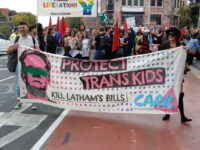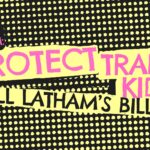Protesting Latham’s Trans Prejudice in Parliament: An Interview With CARR’s April

“How dare you sit there and try to see the rolling back of our rights… trying to attack the most vulnerable people in our society, transgender young people, who have already got it tough enough,” April called out to NSW One Nation MLC Mark Latham.
“You are nothing but a thug and a bigot, who only represents yourself and a tiny number of bigots in this society,” continued the co-convenor of Community Action for Rainbow Rights (CARR).
The activist made these statements from the viewing section of a hall in NSW parliament where two days of hearings were taking place to review new laws – which the NSW One Nation leader has proposed – that would effectively erase the identity of trans youths within the schooling system.
As a security guard approached April and asked her to leave, she then commenced chanting, “When trans rights are under attack, what do we do?” And at that point, about fifteen other activists rose up out of their seats to respond, “Stand up, fight back.”
Attacking the vulnerable
Introduced by Latham last August, the Education Legislation Amendment (Parental Rights) Bill 2020 seeks to create laws that would ban any staff member from making any mention of gender fluidity within the NSW schooling system via threat of losing their jobs and accreditation if they did.
During his second reading speech on the bill, Latham posited that the laws are to counter a “post-modernist attack on the nuclear family”, as leftist social engineers are attempting to “unravel” civilisation, as they try to convince young people that “family and gender are socially constructed”.
On the ground, what these laws would mean is that youths struggling with questions concerning their gender identity who approached a teacher or a guidance counsellor for help would be met with a blank expression.
This effective erasure of trans youths’ identities in schools has the potential to lead to self-harm and suicide. As it is, without these laws, transgender people are eleven times more likely to attempt to take their own lives than the general population.
Creeping conservatism
Nine months ago, when Latham first tabled this bill, many instantly concluded such extreme laws would fall by the wayside. However, NSW parliamentary secretary for education Kevin Conolly has already made clear that he supports the bill.
And what’s more disturbing is that Latham’s Religious Freedoms and Equality Bill, which would enable people of faith to discriminate against others based on their religious beliefs, has recently been endorsed by another parliamentary committee.
Sydney Criminal Lawyers spoke to CARR co-convenor April about why she felt it necessary to protest inside parliament, whether Latham’s anti-trans laws are simply a one-off, and how she sees the trans rights movement is rising in tandem with a broader push for social justice.
Two days of parliamentary review hearings considering Mark Latham’s Parental Rights Bill took place last week. On the first day, you staged a protest within the hall of Parliament House where the inquiry was taking place.
April, what is it about Latham’s legislation that led you to take such abrupt action?
This legislation is extremely aggressive. It would take our rights back decades. This bill is akin to Margaret Thatcher’s Section 28, which she imposed in Britain in the 1980s. It made it a sackable offence for teachers to discuss homosexuality or disclose their own.
So, this is basically the same type of bill, but updated against trans kids. From the point of view of the bigot, this is like the thin edge of the wedge in terms of rolling back all of our rights.
It’s an unprecedented attempt to ban all education to do with transgender issues at schools. It would effectively erase trans young people from the entire education system in NSW.
And it’s also an extreme attack on workers’ rights, because it would make contravening the bill a sackable offence.
Along with calling Latham a “thug” and a “bigot”, you outlined that his bill attacks some of the most vulnerable people in our society, that being trans youth.
Can you speak on what impact Latham’s laws would likely have on these vulnerable children?
Young people in general are oppressed in our society. They’re deprived of their autonomy. They’re deprived of their right to learn about many different things. So, there are already serious inadequacies in our schools.
And there is already a total lack for young people wanting to learn about gender diversity and sex education in schools – that includes learning that it’s okay to be different.
This makes coming to the realisation that you are transgender a really difficult process for many people. There’s already pressure forcing people not to come to this realisation, such as parental pressure, social pressure and peer pressure. The bullying of gender diverse kids is extreme.
It’s no wonder that we see in the statistics that half of all transgender people have attempted suicide. This is a disgrace. And this bill will only increase that figure.
So, that’s why it’s already hard enough for trans kids, without this bill. And we should be pushing for more education within schools, not less.
What was the reaction of Latham and the committee to your protest action? And what happened to you and the other activists involved as a result?
Latham sat there for the first 30 seconds like a stunned mullet. He didn’t really know what to do. He’d been droning on about the opening of the committee hearing, when I interrupted.
There was a supporter on the committee – perhaps a National member – who took it upon himself to try and get me to shut up and sit down.
But this wasn’t my first rodeo, so he failed to shut me up. Then, after I said my piece, the more important thing was all the other people there got up and chanted to show how much opposition there is to Latham.
After the chanting began, Latham was forced to scurry out of the room and reassess while the parliamentary police escorted us out of the building.
They made sure to follow us all the way out to the front. There was a huge line of them on the balcony, while they moved us out of the facility.
Many have dismissed Latham’s Parental Rights Bill on the basis that it’s so extreme it’s hard to believe that after the progress of recent decades such measures could seriously be considered by parliament.
However, another bill that Latham recently tabled – his religious freedoms legislation – was endorsed by a parliamentary committee, which recommended the Coalition draft its own similar laws.
These two bills are ideologically aligned. Are you concerned that the positive reaction to the religious freedoms laws holds some foreboding in terms of the outcome of the inquiry into the parental rights legislation?
Absolutely. Both bills are cause for concern in their own right. And it wasn’t just the Liberal Party who supported Latham’s religious freedoms bill, but also members of Labor did.
From the beginning, CARR has said we can’t be complacent about bills that appear extreme and fringe because it doesn’t mean they won’t gain support amongst the elite.
The elite’s trade is in bigotry and division. So, if there’s no public opposition to these things, they start to gain weight and momentum.
That’s why we’ve already seen a member of the Liberal Party – the parliamentary secretary for education – openly supporting the Parent Rights Bill.
Also, the right-wing of the Liberal Party is champing at the bit for this type of attack on the LGBTI community. And the Liberal Party are the overwhelming majority in NSW parliament.
Without protest the religious freedoms amendments are almost certain to pass, and, as you said, could open the door for the Parental Rights Bill.
We don’t want to be complacent about either of these bills.
In your opinion, what’s Latham’s underlying agenda here?
The underlying agenda is to advance his own position as a powerbroker in NSW parliament.
That’s his personal goal, which aligns with a broader goal of the right-wing of Australian politics. That is to start pushing back against the momentum for the cause of social justice.
If you think about how many people in this country have gone to climate strikes, to marriage equality demonstrations and to Black Lives Matter demonstrations, that’s what they’re trying to push back against because the momentum is on our side.
Latham’s project here is to make himself a powerful player in NSW parliament, by being the person who puts the extreme position out there and then curries favour with the right-wing of the Liberal Party as part of their combined agenda to roll back our rights.
Latham is a self-professed atheist. But he’s aligned himself with the Christian Right. Recently, prominent members of the Christian Right met at the Church and State Summit in Brisbane.
During the conference, the Australian Christian Lobby’s Martyn Iles suggested that in countering the LGBTIQ rights movement post-marriage equality, they should target the transgender community because it’s the weakest link.
What’s going on here? Is this a one-off suggestion by Iles, or is it something that can be seen emerging in other instances?
This is part of an international right-wing movement that’s trying to use transgender issues as the foot in the door.
It’s got nothing to do with religion at the end of the day – religion is just the trojan horse by which the conservative right is pushing this through.
There’s a very cynical element to Mark Latham and the federal Liberals, who claim their religious freedoms bills are trying to protect religious minorities such as Muslims, because the people waging the war against the LGBTI community are the biggest Islamophobes in our society.
They’re just using Christianity as a cover for the project because they know the vast majority of people don’t support attacking LGBTI people. So, they’ve found some rationale to do it.
They want to pretend that it’s all got to do with freedom of religious conscience, when actually it’s about undoing discrimination legislation that we have fought for and won.
And lastly, April, over the last three or four years, the number of trans rights protests in Sydney have increased, and so too has the number of supporters showing up to them.
What’s going on in terms of the trans rights movement at present?
It’s very much gone the way of the gay rights movement, which is a positive. The vast majority of people are starting to come to our side.
In some sense, there’s the momentum of the gay rights movement being so successful, which has flowed into the trans movement.
But it’s also trans people themselves standing up and saying, “I’m real. I’m valid. And I am not going to put up with all of this bullshit from politicians and the media.”
And without that, people’s support in the community wouldn’t be so strong because standing up challenges them to look us in the eye and consider what they’re going to do about us, our oppression and our inequality.
Most people have risen to that challenge to say they are on our side. And that’s really positive.
The question is, what kind of politics do we need to go beyond that? There’s an element of politics that says we just need more transgender people in parliament and big business.
But, as activists and radicals, Community Action for Rainbow Rights says that is not what is needed.
What we need are more mass struggles by ordinary people – both LGBTI and non-LGBTI together – against the whole political class, big business and the corporate media, because, whatever hat those people are wearing, they’re actually all part of a system that oppresses and divides us.
This kind of politics is hopefully resurfacing with the growth of trans rights politics.







